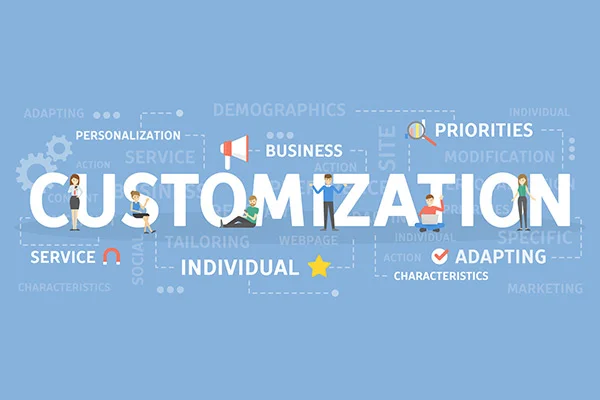Mass Customization: Why “built-to-order” is a healthy step for your business
- Home
- Blog Details

- November 24 2018
- admin
Nowadays, there is a trend where businesses and consumers opt for more personalized products and services. When scaled appropriately, this trend, called Mass Customization, combines the Customization and flexibility of built-to-order products with low production costs. Mass Customization is the practice of providing products and services built or modified as per a customer’s requirements. In other words, mass Customization involves your blueprint mixed with a professional’s expertise and necessary tools to make the perfect product of your desire, which is uniquely yours. Mass Customization is also called built-to-order or made-to-order.
Mass Customization facilitates customized product features while keeping in sync with low unit costs of mass production. Sometimes, mass Customization also involves the modularity of product components. Such flexibility allows effective mix-and-match to build a customized final commodity. Mass Customization has been well adopted in retail, software development, financial services & fintech, and modular home builders. Utilizing such business practices provides an edge over your competitors. With every individual looking for a custom product designed especially for them, more and more companies are now offering Mass Customization to satisfy the needs of their customers.
In his book, Mass Customization: The New Frontier in Business Competition, B. Joseph Pine II talks about four mass customization types. They are:
| Collaborative Customization | Adaptive Customization | Transparent Customization | Cosmetic Customization |
| companies collaborate with customers to offer products uniquely crafted to each client | companies deliver products based on one standard but customizable by the end-user | companies provide personalized products to individual clients without overtly disclosing that they are customized | companies build single standard products but deliver them in different ways as per other customer demands |
| Works great in fashion, apparel, & retail businesses | It fits good in the lighting, luxury bath fittings sector | E-commerce brands and OTT platforms are good examples | Applies to textile, food & beverage industry |
Product Configurators
In CAD software development and services, mass Customization is achieved by using web-based tools like Product Configurators which achieves Customization yet results in savings in cost. Software developers apply personalized product configurators that allow end-users to add, change, modify, or tweak certain features & functions of a core product.
Don’t miss out your chance to have a customized product configurator today
Prescient Technology’s robust IT team can build personalized configurators specifically curated for your business needs. If you have any query, feel free to get in touch with us today.
From the top of the pyramid, mass customization can be categorized into two broad areas:
- B2B (Business to Business) Mass Customization
- B2C (Business to Customer) Mass Customization
Since mass Customization essentially means offering customers according to their orders rather than generic products, it creates a massive differentiator in the minds of both B2B and B2C customers. Let us have a look at how built-to-order personalization works:
Configure: The Product Configurators present a simple user interface for customers to try out various options by changing parameters and selecting different options to suit their specific requirements. Once they are satisfied, they can often preview their selections in the form of a 3D model.
Instant Quote: The quote generation system is linked to the Product Configurator, helping customers with instant quotes for the selections that they make.
Ready to Manufacture: The Product Configurator can generate all the details like manufacturing drawings required by the manufacturing/assembly team without manual intervention. Such innovative manufacturing processes enable the production of interchangeable parts that can be shuffled differently to build a cost-effective product that fulfills client requirements.
The levels of automation depend on the complexity of the product and the nature of the sales cycle. It can be autonomous for simple products (typically B2C), and for complex products (typically B2B), it can be semi-autonomous. Even for B2B products, the semi-automatic process dramatically improves the productivity of the sales team and the design team.
Product configurators are found at a B2B level across diverse industries ranging from Cranes & Hoists, Material Handling and Storage, Pumps, Valves, Bearings, etc. The benefits are:
- Shorter Sales Cycle because of quicker and accurate quotes to prospects
- Shorter Delivery Cycle because of faster and accurate data to the manufacturing team
- Convert more prospects into customers, with more rapid response and sharing relevant CAD data
- Improve the efficiency of the Sales and Design team
- A better understanding of customer’s needs
At a B2C level, product configurators are found across various sectors like laptops, apparel, shoes, jewelry, houses, furniture, etc. The benefits are:
- Differentiation through personalization
- Satisfying the needs of the customers by delivering what they want
- Reduced capital because of reduced inventory
- Customer loyalty
Mass Customization as a brilliant strategy
There is a term known as “product differentiation,” and mass customization allows manufacturers to postpone product differentiation till the end phase of manufacturing. Customized features are more likely to engage consumers since they get to make many decisions about the operation and makeup. The ability to tweak a product based on personal preference has a high possibility of swinging a client’s choice towards what you have to offer than your competitor. Mass Customization also helps you with excess inventory expenses. A JIT (just-in-time) approach can prevent flooding of inventory unnecessarily.
Mass Customization can be used as a part of a marketing strategy where your ability to produce personalized products or provide tailor-made services at a market standard price is used as a lucrative branding of your product. If there is no compromise on quality, on-time delivery, you have a good chance of driving sales, churning profits, and attracting customer loyalty. Prescient Technologes has hands-on experience in creating client-centric, on-demand product config and software solutions and we will be glad to assist you with your needs or queries.

